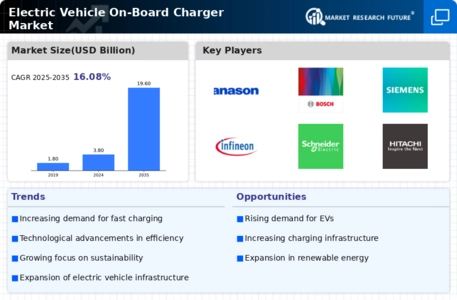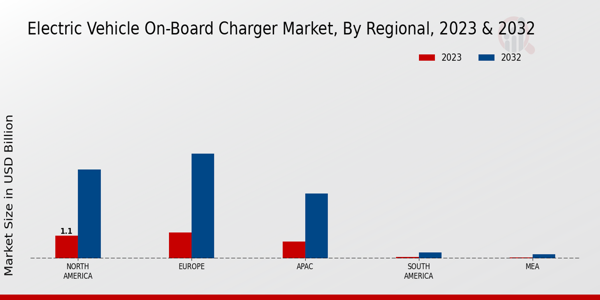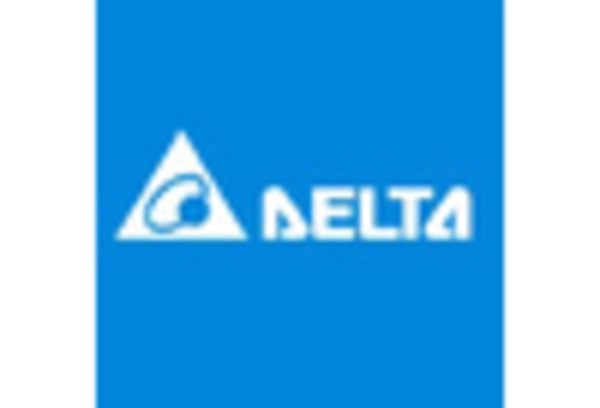Consumer Awareness and Education
Consumer awareness and education regarding electric vehicles and their benefits are crucial drivers for the Electric Vehicle On-Board Charger Market. As consumers become more informed about the advantages of EVs, including lower operating costs and reduced carbon footprints, the demand for on-board chargers is expected to rise. Educational campaigns and outreach programs by governments and organizations are helping to demystify electric vehicle technology and charging processes. By 2025, surveys indicate that a significant percentage of consumers will have a better understanding of EV technology, which could lead to increased adoption rates. This heightened awareness is likely to create a more favorable market environment for on-board charger manufacturers, as consumers seek reliable and efficient charging solutions to complement their electric vehicles.
Rising Demand for Electric Vehicles
The increasing consumer preference for electric vehicles (EVs) is a primary driver for the Electric Vehicle On-Board Charger Market. As more individuals and businesses recognize the environmental benefits and cost savings associated with EVs, the demand for efficient charging solutions rises. In 2025, it is estimated that the number of electric vehicles on the road will surpass 30 million units, significantly boosting the need for advanced on-board chargers. This surge in EV adoption necessitates the development of innovative charging technologies that can accommodate various battery sizes and charging speeds, thereby enhancing the overall user experience. Consequently, manufacturers are compelled to invest in research and development to create more efficient and compact on-board chargers, which is likely to propel market growth.
Expansion of Charging Infrastructure
The expansion of charging infrastructure is a vital driver for the Electric Vehicle On-Board Charger Market. As more charging stations are installed in urban and rural areas, the accessibility of charging solutions for electric vehicles increases. This expansion is essential for alleviating range anxiety among potential EV buyers, thereby encouraging more consumers to consider electric vehicles. By 2025, it is projected that the number of public charging stations will exceed 1 million globally, creating a robust ecosystem for EVs. This growth in infrastructure not only supports the existing EV market but also stimulates demand for advanced on-board chargers that can optimize charging times and enhance user convenience. Consequently, manufacturers are likely to focus on developing chargers that are compatible with a wide range of charging networks.
Government Incentives and Regulations
Government policies and incentives aimed at promoting electric vehicle adoption play a crucial role in shaping the Electric Vehicle On-Board Charger Market. Many countries have implemented stringent emissions regulations and offer financial incentives for EV purchases, which indirectly increases the demand for on-board chargers. For instance, tax credits, rebates, and grants for EV buyers encourage consumers to transition from traditional vehicles to electric ones. As of 2025, several regions have set ambitious targets for EV sales, with some aiming for 100 percent of new vehicle sales to be electric by 2035. This regulatory environment fosters a favorable market landscape for on-board charger manufacturers, as they must align their products with evolving standards and consumer expectations.
Technological Innovations in Charging Solutions
Technological advancements in charging solutions are significantly influencing the Electric Vehicle On-Board Charger Market. Innovations such as fast charging capabilities, wireless charging, and smart charging systems are becoming increasingly prevalent. These technologies not only enhance the convenience of charging but also improve the efficiency of energy use. For example, the introduction of ultra-fast chargers can reduce charging times to under 30 minutes, making EVs more appealing to consumers. As of 2025, the market is witnessing a shift towards integrated charging solutions that combine on-board chargers with vehicle-to-grid technology, allowing EVs to return energy to the grid. This trend indicates a growing emphasis on sustainability and energy management, which is likely to drive further investment in on-board charger development.


















Leave a Comment